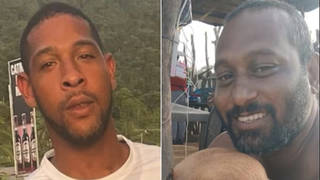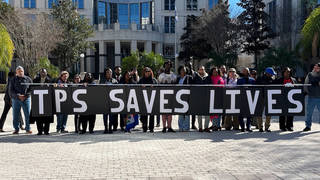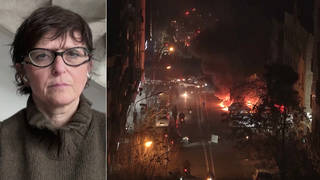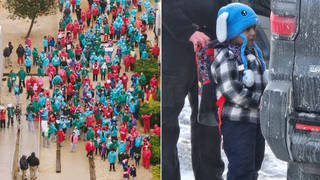
President Donald Trump is escalating his attack on progressive groups following the assassination of right-wing activist Charlie Kirk and a deadly shooting that targeted an immigration jail in Dallas. White House officials have repeatedly blamed Democrats and left-wing groups for contributing to political violence, but investigative reporter Ken Klippenstein says the motivations of people who commit such acts are often more complicated.
Klippenstein has reported on the backgrounds of Kirk’s accused killer and the gunman who targeted the Dallas ICE facility, and says friends described both young men as somewhat isolated and largely uninterested in partisan politics. “That was perhaps the most normal thing about these two shooters, that they were disengaged with politics,” he says.
Transcript
AMY GOODMAN: This is Democracy Now!, democracynow.org, The War and Peace Report. I’m Amy Goodman.
President Trump is escalating his attack on progressives following the assassination of the conservative activist Charlie Kirk and a deadly shooting that targeted an immigration jail and ICE van in Dallas, Texas. On Thursday, President Trump signed a national security memo authorizing government-wide investigations into nonprofits, activists and their donors. The memo calls for the FBI’s “Joint Terrorism Task Force,” quote, to coordinate a, quote, “national strategy to investigate, prosecute and disrupt entities, and individuals engaged in political violence,” unquote.
Since the assassination of Charlie Kirk September 10th, President Trump, Vice President JD Vance and other White House officials have repeatedly blamed Democrats and progressive groups for the attack, even though no evidence has emerged linking the accused shooter, Tyler Robinson, as well as the person involved in the ICE shootings, with any progressive organizations. On Thursday, federal authorities said they also have not uncovered evidence linking the man who attacked that ICE facility to outside groups.
Wednesday’s shooting in Dallas left one ICE detainee dead and two migrants critically injured. Authorities say the suspected gunman, Joshua Jahn, who died from a self-inflicted gunshot wound, was attempting to target ICE agents, not detainees. This is FBI agent Joseph [Rothrock], speaking at a news conference yesterday.
JOSEPH ROTHROCK: Jahn specifically intended to kill ICE agents. He fired at transport vehicles carrying ICE personnel, federal agents and detainees. He also fired multiple shots into the windows of the office building, where numerous ICE employees do their jobs every day. We now know that Jahn engaged in significant high degree of pre-attack planning. He searched for information about the — about the office building and how to track ICE agents’ locations. Jahn also acknowledged the potential for other casualties.
AMY GOODMAN: On Thursday, President Trump reiterated his threat against what he called “the radical left.”
PRESIDENT DONALD TRUMP: The radical left is causing this problem — not the right, the radical left. And it’s going to get worse. And ultimately, it’s going to go back on them. I mean, bad things happen when they play these games. And I’ll give you a little clue: The right is a lot tougher than the left. But the right’s not doing this. They’re not doing it. And they better not get them energized, because it won’t be good for the left.
AMY GOODMAN: We go right now to Madison, Wisconsin, where we’re joined by investigative journalist Ken Klippenstein, who’s been reporting on the shooting of Charlie Kirk and the attack on the ICE jail in Dallas. His most recent article, “The ICE Shooter’s Politics: Joshua Jahn’s friends speak.”
Ken, welcome back to Democracy Now! Tell us what you found out.
KEN KLIPPENSTEIN: Hi, Amy. Good to be back.
Well, I tracked down three friends of the deceased shooter, who had known him since childhood, and asked them straightforwardly, “What were his politics? What were his views?” And their answer was, basically, that he had libertarian leanings, but he was generally apolitical. And that was something that was corroborated by his own brother, who gave an interview saying, “This guy wasn’t political. I had never heard him say anything about ICE prior to this.”
And one of the most surprising aspects of this investigation for me was talking to his former friends, and I kept running into the same issue, which was that, “Oh, you know, I had fallen out of touch with him and didn’t have recent insight into what his views were.” I kept hearing this. And by the third time I hear it, the person says, “Oh, you know what happened? Probably no one knew him recently, other than maybe his immediate family, because he started spending huge amounts of time on the anonymous chat forum called 4chan and just playing video games.” So, apparently, he dropped out of school, kind of became a recluse, lost all social contact, immersed himself in this world of — just to describe 4chan — provocation and trolling. And, you know, people would describe it as a sort of controversial site.
And then there ends up being this shooting. And I ask his friends about it, “OK, he has written on, you know, these unused bullets, 'anti-ICE.' Clearly, it’s anti-ICE, right?” And his friends say, “I wouldn’t interpret it that way. He was never a sincere guy. Everything he said was laced with irony and sarcasm. He was a very sardonic person.” So they were all skeptical of the idea that this was anything but some practical joke. They said that, you know, because of his libertarian leanings, he didn’t like the government. And that, apparently, according to investigators, is — was one of the conclusions they came to, based on what they’ve been able to go over that he left behind. But that wasn’t specific to the right or the left. That was a general disdain for government and the disdain that he seemed to have for all sorts of things in life.
AMY GOODMAN: And Kash Patel, the FBI director, tweeting out this picture of one of his bullets saying “anti-ICE,’ and also this misinterpretation, it sounds like you’re saying, when they say he’s anti-federal government, that it’s this particular government, or is it just all government?
KEN KLIPPENSTEIN: Yeah, as his friends described to me, it was all government. He was someone who was contemptuous, I would say, of authority in general. I was sent videos of his comedy going back to middle school, and what came across in them was he was always being tongue in cheek and making fun of things, which, you know, isn’t a problem in itself. But as was described to me, once he started spending all this time on 4chan and gaming — and I want to stress, you know, there are lots of gamers. In his case, though, we’re talking over 10,000 hours on just three video games, all shooter games, according to his Steam profile, which is like a gaming platform. And, you know, as was described to me, that became his entire community, these chat rooms and the people that he talked to in these video games. And it sounded like he started getting more and more extreme views. His friends stopped talking to him because they couldn’t stomach, you know, his shock humor and how over the top things were getting. And that’s the last insight they have. And then we see what happens. And sadly, people didn’t seem — they were surprised, but I don’t know that they were shocked, based on my conversations with his former friends.
But yeah, it’s a very complicated case to go through, because within just minutes of the investigators getting that photo of the unspent shell casings that had “anti-ICE” written, FBI Director Kash Patel posted that to social media, which is very unusual. In FBI protocol, they tend to not want to release things, because they don’t want to harm an ongoing investigation, you know, tip off the people that they’re investigating, or, in this case, imperil conclusions that the investigators might come to. And, of course, social media took with that — took that and ran with it, and said, right up to President Trump, in a statement to Truth Social saying, you know, “This is the radical left, clearly. Look, 'anti-ICE.' That must be — that must be the left.” And I talked to his friends, and they said, “Well, that doesn’t sound like how the left talks. They say things like 'abolish ICE' or, you know, maybe more fiery language than that.” But yeah, there was a lot of skepticism about this very straightforward interpretation of what happened.
AMY GOODMAN: So, do you see similarities between these terminally online, nihilistic politics of both Jahn and also Tyler Robinson, how he was characterized, the man who assassinated the conservative activist Charlie Kirk?
KEN KLIPPENSTEIN: Yes, definitely. At first, I thought, you know, gaming has become to young people — it’s sort of like the NFL is for lots of folks, including myself. I’m someone that’s played video games in the past plenty, you know, so I don’t want to stigmatize it. That being said, the way in which these guys talk is very specific to the subcultural spaces in which they lived — in the case of Tyler Robinson, on Discord, which, you know, in the major press, I think there’s confusion about what Discord is. It’s basically just WhatsApp for video games. You can make phone calls, video calls, texts and things.
I had sent to me, based on several of these chat rooms that he was in, messages from Robinson. And it was basically the same picture: not somebody who was overtly political. There was maybe one — there was literally one post mentioning Trump and one post mentioning Biden. And in the case of Biden, it was about the — I think both were about the 2020 election. So, of course, everyone’s paying attention to politics at that time.
But it was a very different picture than what you would have gotten, certainly, from the Trump administration, which took this and ran with it, immediately saying that this is evidence of the out-of-control, violent assassination culture of the left, but also in major press. I mean, I don’t blame people for thinking, “OK, well, this must have been political.” But when I talk to folks, both in the case of Tyler Robinson in Utah and in Texas, you quickly get the impression that they both, perhaps like most of the country, despised both political parties, to the extent that they had views on politics at all. And I think that picture gets lost when the major media, overwhelmingly based in Washington — you know, I lived there for several years, and the sense is, you know, there’s two teams, and everybody wants to know which team you are. People generally affiliated with one of the other. That’s not how most Americans see politics. And that was perhaps the most normal thing about these two shooters, that they were disengaged with politics.
AMY GOODMAN: I want to thank you very much for being with us, Ken Klippenstein. We want to have you back on soon. There’s so much that you’re reporting, and we’ll link to your pieces, most recently, “The ICE Shooter’s Politics.”
Coming up, we speak to the deputy foreign minister of Cuba, as Latin American leaders condemn a new U.S. bombing campaign in the Caribbean, mainly aimed at Venezuela. Back in 20 seconds.
[break]
AMY GOODMAN: “I Give You a Song” by Silvio Rodríguez, performing at Central Park Summer Stage in 2017.













Media Options